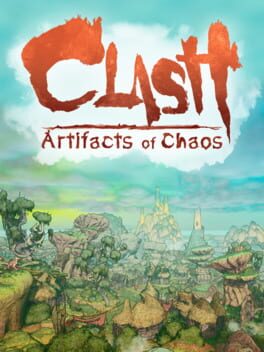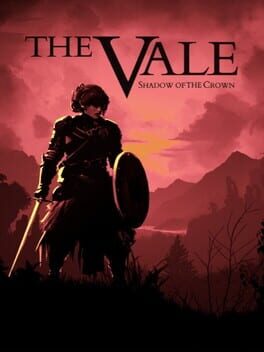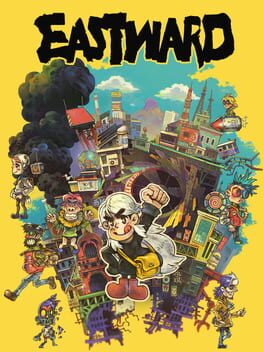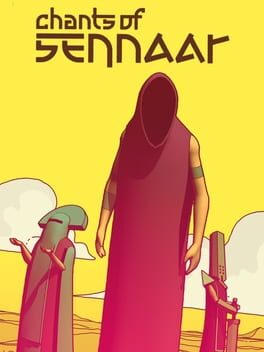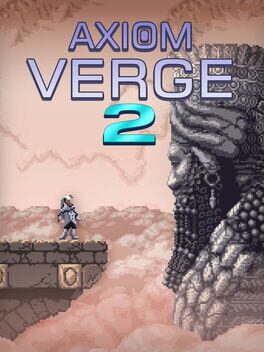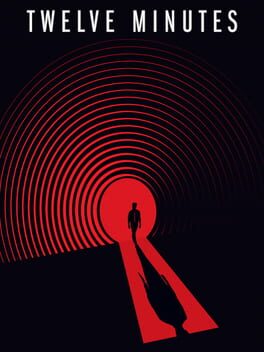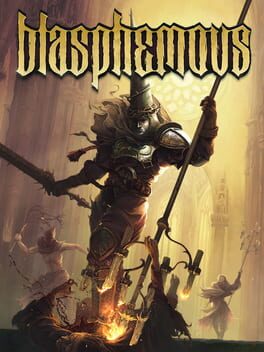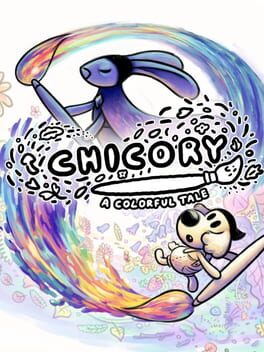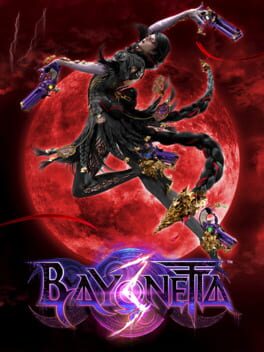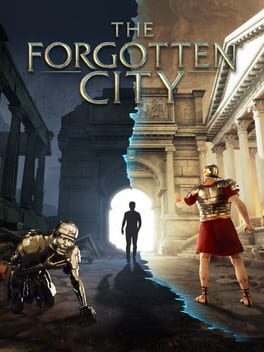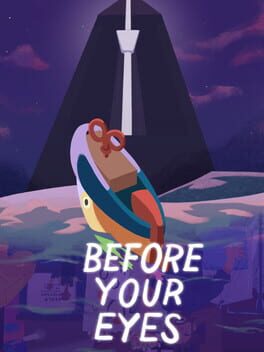I fell absolutely head over heels in love with this game from the moment I booted up the demo for the first time. It is weird, ugly, gorgeous, clunky, satisfying and ten other adjectives that will contradict each other, because Clash revels in that contradiction and not bending to anything but the unique rule(s) of this world.
I was being reminded of the original Nier a lot with this game, not only with soundtrack similarities, which certainly play its part, both being absolutely unique and outstandingly beautiful but also the general mix of riveting storytelling and characters with at times rough execution that will undoubtely scare off a lot of players reflected in the low critics scores. Also Godhand comes to mind, filling out the gameplay side of this analogy. All of these facts also make it absolutely ripe to simmer and manifest as a hidden gem and cult classic guaranteed to become someones favorite game of all time.
All the criticism out there of this game is probably very valid, but this is this kind of game that when it clicks, it fucking clicks, which is what happened for me and I love this game to pieces without any reservation.
I was being reminded of the original Nier a lot with this game, not only with soundtrack similarities, which certainly play its part, both being absolutely unique and outstandingly beautiful but also the general mix of riveting storytelling and characters with at times rough execution that will undoubtely scare off a lot of players reflected in the low critics scores. Also Godhand comes to mind, filling out the gameplay side of this analogy. All of these facts also make it absolutely ripe to simmer and manifest as a hidden gem and cult classic guaranteed to become someones favorite game of all time.
All the criticism out there of this game is probably very valid, but this is this kind of game that when it clicks, it fucking clicks, which is what happened for me and I love this game to pieces without any reservation.
2021
It is a weird sensation to play a game with your eyes closed. The concept doesn't work perfectly, overlapping sounds are a problem when trying to discern the direction of attacks and the scope obviously had to be limited and adjusted to not just have thousands of RPG menues that need to be read out one by one. As a whole it works surprisingly well, though. The immersion achieved by just relying on your hearing in detailed soundscapes is pretty impressive. And while the story and world are standard medieval fantasy, the characters really shine through good writing and emotional performances. I really liked the concise side quest structure, offering self contained vignettes that get straight to the point and can offer variety in setting more easily due to the lack of visuals needed to build unique spaces. Another surprise was the combat system, which has an unexpected depth to it, adding new mechanics constantly throughout the 6 hour experience, while still remaining accessible and simple. This is an interesting counterpart to Before Your Eyes this year and I recommend checking this out just for the novelty of the interaction, it is definitely worth it.
2021
Really disappointed to have reached the point of having lost all motivation to continue further at this point after about 9 hours considering this was among my most anticipated games for the longest time.
This is probably the most beautiful sprite art I have ever seen in a game and the world oozes with life. Everything feels great to interact with, but there is just a lack of substance that really breaks my heart. It has tons of quirky characters that I stopped interacting with because the writing was just too bland to care. There are so many weird pacing decisions that grind the game to an absolute halt for 1-2 hours at a time sending you across town to fetch arbitrary things without any meaningful payoff.
I will probably finish this at some point, I just can't bother at the moment. The world and art are just too beautiful to not see it through, I just wish they would have narrowed down a narrative core instead of spreading themselves so paper thin.
This is probably the most beautiful sprite art I have ever seen in a game and the world oozes with life. Everything feels great to interact with, but there is just a lack of substance that really breaks my heart. It has tons of quirky characters that I stopped interacting with because the writing was just too bland to care. There are so many weird pacing decisions that grind the game to an absolute halt for 1-2 hours at a time sending you across town to fetch arbitrary things without any meaningful payoff.
I will probably finish this at some point, I just can't bother at the moment. The world and art are just too beautiful to not see it through, I just wish they would have narrowed down a narrative core instead of spreading themselves so paper thin.
2023
I could spend endless more hours in this world, deducing languages and nuances in the relationships between them, such a deeply satisfying experience, enhanced by an enchanting soundtrack and mesmerizing art and architecture blending between cozy and luscious and oppressive and intimidating expertly.
I just can't. After ten hours I don't feel enough of a drive to keep playing. For me the Xenoblade games are bad examples of maximalist design at this point. Creating quality not by elegant subtraction but by addition of more and more systems and dimensions of complexity to the point of legitimately feeling like parody of itself to me.
I could stand Xenoblade 3 for longer than the first one due to an interesting story hook and early development, but my god the sheer spam of new systems, menues, and mechanics truly made my head hurt, killing any drive to play further - hearing how much more is to come, hailed as a positive aspect. This made me realize that the series is definitively not for me, despite my best efforts which greatly disappoints me because of the excitement seemingly everyone else has for the franchise and my absolute adoration of Xenogears and the hope of some DNA of that transfering over.
The baseline combat is so clunky and uninteresting to me that I can't stomach pushing through that for 90 more hours, not even starting on the incredibly annoying line repetitions and dull environments fully covered in ever respawning loot and enemies. I read that that this makes the game feel alive and dynamic while it did the complete opposite for me feeling like a wasteland entirely populated by procedurally generated content. As a level designer the terrain navigation truly shocked me with how clunky and unpolished it is. You constantly run into slopes you are expected to awkwardly jump your way up while other ledges are not accessible to you while being only slightly above your jump height, adding to the feeling of procedural generation, lacking the affordances and clean communication of intentional level design.
This is all pretty much rambling about how this game just isn't for me in the end, recognizing that it's obviously not a bad game, it's just rare that a game in a genre I usually really enjoy so completely goes against anything I value in games and I am envious of everyone able to fall in love with the games in this series, I wish I was one of them.
I could stand Xenoblade 3 for longer than the first one due to an interesting story hook and early development, but my god the sheer spam of new systems, menues, and mechanics truly made my head hurt, killing any drive to play further - hearing how much more is to come, hailed as a positive aspect. This made me realize that the series is definitively not for me, despite my best efforts which greatly disappoints me because of the excitement seemingly everyone else has for the franchise and my absolute adoration of Xenogears and the hope of some DNA of that transfering over.
The baseline combat is so clunky and uninteresting to me that I can't stomach pushing through that for 90 more hours, not even starting on the incredibly annoying line repetitions and dull environments fully covered in ever respawning loot and enemies. I read that that this makes the game feel alive and dynamic while it did the complete opposite for me feeling like a wasteland entirely populated by procedurally generated content. As a level designer the terrain navigation truly shocked me with how clunky and unpolished it is. You constantly run into slopes you are expected to awkwardly jump your way up while other ledges are not accessible to you while being only slightly above your jump height, adding to the feeling of procedural generation, lacking the affordances and clean communication of intentional level design.
This is all pretty much rambling about how this game just isn't for me in the end, recognizing that it's obviously not a bad game, it's just rare that a game in a genre I usually really enjoy so completely goes against anything I value in games and I am envious of everyone able to fall in love with the games in this series, I wish I was one of them.
2021
What I will give the biggest credit in Axiom Verge 2 are the bold aesthetic and game design decisions making up the whole structure of this game. This isn't a by the books retro-style metroidvania set in a grim alien world. Where the first game was Alien, this feels more like The Thing and Dune depending on the region. The game draws from refreshingly untapped cultural backgrounds manifesting in the world and music and overall feeling. But not only the aesthetic is unique, the gameplay also breaks major conventions - I mean, there are no bosses tied to progression or abilities at all and the game jumps between two dimensions constantly, mixing up the way you interact with the world.
The one major criticism I have is the combat. There is a variety of (mostly melee) weapons to get but the focus on melee combat doesn't pay off unfortunately, as the combat feels clunky and unresponsive. You constantly miss enemies because you have to crouch to hit most of them and the dynamic terrain with slopes and ledges makes getting an edge over enemies difficult because they constantly change elevation leading to frustrating button mashing.
The exploration is superb, constantly feeding you new abilities to get around obstacles. These abilities can be a straightforward grappling hook or more unique mechanics that offer plenty of room for experimentation as the game gets out of your way and doesn't hold your hand to figure stuff out, even if there are a lot of really helpful quality of life additions such as custom map markers and waypoints.
Ultimately, I like this sequel probably around as much as the first one, but surprisingly for different reasons. Their differences make it easy to recommend both of them equally and while many design decisions of the second one might and will alienate some people, I will always hold it in high regard if a game makes these bold decisions.
The one major criticism I have is the combat. There is a variety of (mostly melee) weapons to get but the focus on melee combat doesn't pay off unfortunately, as the combat feels clunky and unresponsive. You constantly miss enemies because you have to crouch to hit most of them and the dynamic terrain with slopes and ledges makes getting an edge over enemies difficult because they constantly change elevation leading to frustrating button mashing.
The exploration is superb, constantly feeding you new abilities to get around obstacles. These abilities can be a straightforward grappling hook or more unique mechanics that offer plenty of room for experimentation as the game gets out of your way and doesn't hold your hand to figure stuff out, even if there are a lot of really helpful quality of life additions such as custom map markers and waypoints.
Ultimately, I like this sequel probably around as much as the first one, but surprisingly for different reasons. Their differences make it easy to recommend both of them equally and while many design decisions of the second one might and will alienate some people, I will always hold it in high regard if a game makes these bold decisions.
2021
This game was incredibly frustrating to play. From the cast and pedigree of Annapurna Interactive, which I fared well with trusting blindly until this point, I went into this expecting a highly condensed, super polished experience.
This game is not that, it is incredibly janky, stiff and annoying to control. It puts tons of remarkable emphasis on the reactivity achievable in this limited scope - having to keep in mind where someone can hear you talk, where someone is standing at certain times or other minor details - ultimately, though this stuff boils down to a very limited interaction space and even in this limited scope the game can't keep up with the reactivity required to fully immerse the player. Dialogue options persist throughout the game even when the player's and character's knowledge change, reframing the context of the option, which leads to bizarre tonal whiplash and potentially ruins a cycle that required annoying, tedious preperations you have speedran through for the fifth time in a row to try out one minor change.
The mystery and ultimate narrative package as a whole is what kept from dropping the score lower, because having seen it through, the threads it lays throughout the experience are well crafted to keep you entertained for the duration of the game and while the execution wasn't perfect or even great most of the time, it came together in the end in a way I did not see coming, leaving well crafted room for interpretations.
This game is not that, it is incredibly janky, stiff and annoying to control. It puts tons of remarkable emphasis on the reactivity achievable in this limited scope - having to keep in mind where someone can hear you talk, where someone is standing at certain times or other minor details - ultimately, though this stuff boils down to a very limited interaction space and even in this limited scope the game can't keep up with the reactivity required to fully immerse the player. Dialogue options persist throughout the game even when the player's and character's knowledge change, reframing the context of the option, which leads to bizarre tonal whiplash and potentially ruins a cycle that required annoying, tedious preperations you have speedran through for the fifth time in a row to try out one minor change.
The mystery and ultimate narrative package as a whole is what kept from dropping the score lower, because having seen it through, the threads it lays throughout the experience are well crafted to keep you entertained for the duration of the game and while the execution wasn't perfect or even great most of the time, it came together in the end in a way I did not see coming, leaving well crafted room for interpretations.
2019
I would lie if I said that I could follow any of the lore in this game even in the slightest, it went way over my head. Still, I can absolutely appreciate the worldbuilding achieved and admire the depth and consistency present in every aspect of the storytelling, even if it isn't the most digestible narrative. It certainly feels fresh in the mythology and cultural background used, even if the tone and gruesome nature mirrored in the gameplay is familiar in the genre.
What drove me to almost 100% this game is a really tight gameplay loop where most collectibles serve an in world purpose and are hidden at a perfectly balanced rate, where you actually feel like you can totally collect everything without investing dozens of extra hours searching every corner. This is also helped by a strong map that removes frustration by showing you when a room is or isn't a dead end if you pay attention.
The boss fights are definite highlights, offering creative mechanics and making the fights clearly accessible to master with the moves available to you, avoiding big frustration points often present in these tough Souls-likes. As tight as the combat is, the platforming didn't work that smoothly too often, unfortunately, even if the added speedrun challenges were extremely fun to master once accepting the quirks of the platforming.
In general, there has been a lot of work being done on the game in the form of free updates since release. Since this was my first time playing, I can't speak to the differences, but I really enjoy how they implemented the new content into the base game, where I didn't know something was added until looking it up specifically, which makes Blasphemous at this point a really nice package and one of the better metroidvanias out there.
What drove me to almost 100% this game is a really tight gameplay loop where most collectibles serve an in world purpose and are hidden at a perfectly balanced rate, where you actually feel like you can totally collect everything without investing dozens of extra hours searching every corner. This is also helped by a strong map that removes frustration by showing you when a room is or isn't a dead end if you pay attention.
The boss fights are definite highlights, offering creative mechanics and making the fights clearly accessible to master with the moves available to you, avoiding big frustration points often present in these tough Souls-likes. As tight as the combat is, the platforming didn't work that smoothly too often, unfortunately, even if the added speedrun challenges were extremely fun to master once accepting the quirks of the platforming.
In general, there has been a lot of work being done on the game in the form of free updates since release. Since this was my first time playing, I can't speak to the differences, but I really enjoy how they implemented the new content into the base game, where I didn't know something was added until looking it up specifically, which makes Blasphemous at this point a really nice package and one of the better metroidvanias out there.
When I tried the demo on Steam last year, I quickly brushed it aside as a gimmicky color-book adventure and ignored it after that. After release a solid number of remarkably high review scores convinced me to give this another shot and oh boy, did I fall in love. Chicory is essentially a 2D Zelda game without combat and a strong focus on metroidvania-style progression, puzzles and exploration. I don't like to play with mouse and keyboard for comfort reasons these days and I was afraid that a game centered around precision painting would fall flat with an analog stick and to be fair, it really isn't the most ideal input device for this mode of gameplay but it works totally fine after getting used to it - and certain optional upgrades will definitely make your life easier as you progress. This is due to the easy going nature of all aspects of the design, while there are some sections that require fast, precise inputs, you aren't punished much for failing, and pretty much every action of yours in the world is reversible.
I am not the biggest fan of the 2D Zelda games, so I can confidently say that this is probably my favorite in the genre. The characters and narrative are so full of heart, the puzzles are clever but never overwhelming and the stellar music by Lena Raine adds an incredibly rewarding layer to exploring all the different nooks in the world. The game drove me to spent extra time in it to explore every part of the map and finish even the most (seemingly) mundane side errants just to get the chance for some new character interactions, which is high praise to the charming writing and world design, that allows its characters plenty of room to breathe and surprise you in unexpected places. I really can't emphasize enough how much this game surprised me. It brought me so much joy over the last weeks and actually hit home quite hard with its themes and narrative. I can't recommend Chicory enough, it is so so good.
I am not the biggest fan of the 2D Zelda games, so I can confidently say that this is probably my favorite in the genre. The characters and narrative are so full of heart, the puzzles are clever but never overwhelming and the stellar music by Lena Raine adds an incredibly rewarding layer to exploring all the different nooks in the world. The game drove me to spent extra time in it to explore every part of the map and finish even the most (seemingly) mundane side errants just to get the chance for some new character interactions, which is high praise to the charming writing and world design, that allows its characters plenty of room to breathe and surprise you in unexpected places. I really can't emphasize enough how much this game surprised me. It brought me so much joy over the last weeks and actually hit home quite hard with its themes and narrative. I can't recommend Chicory enough, it is so so good.
2022
Can't wait for multiverse narratives to die in a fire.
Bayonetta 3 is a good action game but a huge step down for the Bayonetta franchise and perhaps the biggest disappointment I have ever felt in a game. Not only is the story an incoherent, embarrassing mess (not that the other two had a high bar to overcome), but unfortunately the gameplay is completely bogged down with the new focus on summoning gigantic monsters in every battle, which creates a clusterfuck of visual clutter and takes the fun and speed out of the otherwise flawless combat system with great new weapon additions.
Platinum really had to sign a monkey's paw deal with Nintendo it seems. On the one hand the franchise was saved, but on the other hand it was confined to the shackles of technological jail that are Nintendo's consoles, meaning that Bayonetta 3 might actually look and feel worse than Bayonetta 1 on the 360 did, which is such a bummer.
I am not hopeful at all for the future of Bayonetta, unfortunately. The story and character decisions did its part, certainly, but most importantly it feels like I have lost the confidence in the belief that Platinum has a coherent vision for the franchise and knows what the strengths are, because Bayonetta 3 certainly did not play to them.
Bayonetta 3 is a good action game but a huge step down for the Bayonetta franchise and perhaps the biggest disappointment I have ever felt in a game. Not only is the story an incoherent, embarrassing mess (not that the other two had a high bar to overcome), but unfortunately the gameplay is completely bogged down with the new focus on summoning gigantic monsters in every battle, which creates a clusterfuck of visual clutter and takes the fun and speed out of the otherwise flawless combat system with great new weapon additions.
Platinum really had to sign a monkey's paw deal with Nintendo it seems. On the one hand the franchise was saved, but on the other hand it was confined to the shackles of technological jail that are Nintendo's consoles, meaning that Bayonetta 3 might actually look and feel worse than Bayonetta 1 on the 360 did, which is such a bummer.
I am not hopeful at all for the future of Bayonetta, unfortunately. The story and character decisions did its part, certainly, but most importantly it feels like I have lost the confidence in the belief that Platinum has a coherent vision for the franchise and knows what the strengths are, because Bayonetta 3 certainly did not play to them.
2021
A valiant, but ultimately messy effort. At times I was so immersed and fascinated by the world and setting that is crafted and all the systems interacting with each other only to be forced out by overall jank, repetition and systems not fully recognizing my actions. The last point is the most important one. Systemic games like this one that are built on choices, consequences and player knowledge live and die by the integrity of their simulation. What happens if the player pushes against the systems presented in the game? If the game doesn't break and even anticipated the choice a feeling unlike any other is created. The problem is, though, that you have to support an enormous number of interactions in a game where you interact with a decently sized cast of characters going about their lives in a roman city across multiple time loops. And this game unfortunately broke the illusion a few too many times for me in the end. I would still wholeheartedly recommend this game to everyone who is curious due to its low time investment, as I mentioned, this is a truly valiant effort that hits on so many points, I just wish it were a little more polished in the end. Also I was incredibly weirded out by that final ending, a bold direction certainly to put it favorably.
2021
